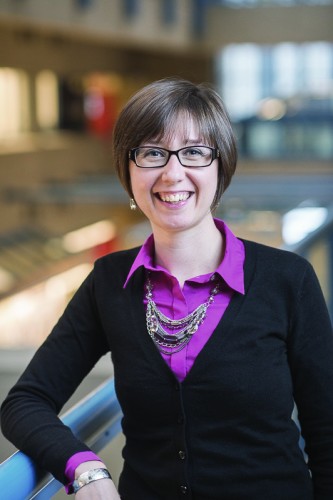Dr. Catherine Rawn is a tenure-track faculty member in the department of Psychology who specialises in teaching and educational leadership. She teaches undergraduate courses as well as a graduate seminar on Teaching of Psychology. In her spare time, she enjoys running marathons, cooking, and building valuable friendships.
Dr. Rawn is passionate about harnessing the power of education to enlighten and inspire people toward personal growth and building a better world. She is also passionate about issues like access to education, particularly for women from low income backgrounds or rural areas. She believes that education can offer not only financial stability for women, but also a deeper, more complex view of the world, and a powerful source of identity. “For me personally, education means freedom,” she says. Dr. Rawn is also interested in the subtle ways that gender stereotypes hinder expectations of ones self, others, our body image, and the biases against women that choose a child-free life.
Dr. Rawn and Inspiration
As she was growing up, Dr. Rawn had some amazing teachers and managers who inspired her to keep learning and push beyond her limits. One woman in particular was her high school teacher, Eileen Clinton; Dr. Rawn is currently in the process of establishing a bursary for UBC Arts students in her name. Dr. Rawn says she was inspiring because she challenged the status quo in her daily life, invited students to question their deepest held assumptions about the world, created opportunities for learning inside and outside the classroom, and encouraged students to be their best.
Dr. Rawn and International Women’s Day
Dr. Rawn celebrates the strong women who have personally affected her life, including family, friends, past teachers, and advisors. Additionally, she looks to women who have, and continue to, stand up for education rights, including Ayaan Hirsi Ali, Malala Yousafzai and, from within her own discipline, Mary Whiton Calkins, who was the first female president of the American Psychological Association despite being denied her PhD because of her sex.
Dr. Rawn also celebrates women who push through sexist barriers to hold powerful and visible positions in male-dominated professions. For example, she recalls noticing female politicians such as Sheila Copps (former Deputy Prime Minister) and Kim Campbell (Canada’s first and only female Prime Minister) when she was growing up. Before she had awareness of their politics, the fact that powerful women existed and put themselves out there made them role models and symbols of what is possible for women, inspiring the next generation.
Dr. Rawn and Female Empowerment
To Dr. Rawn, female empowerment means not feeling limited by gender role expectations, not feeling pressured to have children or to dye her hair as it starts to grey, confidently negotiating and acknowledging her legitimate expertise while wearing heels if they go with her outfit. “Female empowerment is looking in the eye the man—the teacher—who told my high school class that janitors but not CEOs came from the neighbourhood in which I grew up, telling him he was wrong and not telling him that over 15 years later I still feel the heat of my shame that day,” she explains. It means speaking up for equitable treatment for people of all genders, sexual orientations, races, abilities, socioeconomic status, and any other dimension of diversity, so that all people can live to their full potential.

